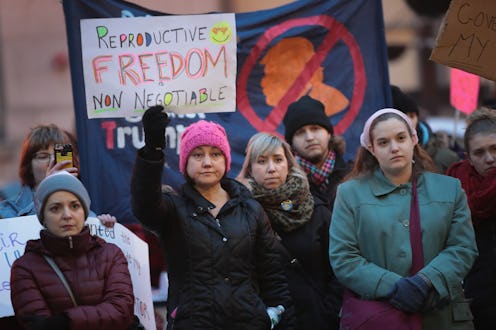News
How Trump's Next SCOTUS Pick Could Screw With Your Birth Control

President Trump will soon have the chance to appoint another Supreme Court justice, as Anthony Kennedy announced Wednesday that he'll be retiring in July. In all likelihood, Kennedy's retirement will shift the court in a decidedly more conservative direction, and may result in a significant erosion of reproductive rights in America. In addition to the possible overturning of Roe v. Wade, some have wondered if birth control could become illegal once Kennedy's replacement is appointed.
In the most literal sense, no. The chances that a future court would actually ban all forms of birth control are practically non-existent. However, the court could pave the way for states to ban certain forms of contraception on their own.
The Supreme Court first established a right to birth control in 1965 with its ruling in Griswold v. Connecticut. That case concerned a Connecticut law that banned the sale and use of "any drug, medicinal article or instrument for the purposes of preventing conception," and imposed a 60-day prison sentence for anybody who violated it.
Planned Parenthood and others took that law to court, and in a 7-2 ruling, the court ruled that contraception is a constitutional right — at least, for married couples. It wasn't until the Eisenstadt v. Baird ruling in 1972 that the court extended contraception rights to unmarried couples as well.
Any future court ruling that banned contraceptives, then, would have to grapple with those two cases — either by overturning them entirely or, alternatively, interpreting them in a way that somehow permitted contraceptives to be banned (This is similar to how the court could effectively ban abortion without actually overturning Roe v. Wade).
In order for the court to even be in a position to rule on contraceptive law, however, it would first have to take up an appeal of an existing lawsuit. In all likelihood, here's how that would play out: A state would pass a law banning some or all contraceptives; progressive and women's rights groups would challenge the law as a violation of Griswold and Eisenstadt; that lawsuit would make its way up to the Supreme Court; and finally, the court would then issue a ruling.
If the court did issue a ruling that overturned or otherwise gutted those two court cases, birth control wouldn't immediately become illegal. However, states would then have the constitutional right to pass their own laws banning contraception, and so would the federal Congress. Although it's very difficult to see even a Republican-controlled Congress passing an outright ban on contraceptives, it's entirely possible that any number of states would do so.
The other significant contraceptive case that came before SCOTUS was Burwell v. Hobby Lobby, which concerned Obamacare's contraceptive mandate and whether it's constitutional to require religious employers to provide health insurance plans to their employees that cover contraceptives. That case has an extremely complicated legal history and was eventually combined with several other similar lawsuits. In May 2016, SCOTUS refused to issue a ruling on the policy and sent it back to the lower courts.
It's unclear where the contraceptive mandate goes from here, and the Supreme Court could well end up ruling on it again. However, none of that concerns the legality of contraceptives themselves; it merely addresses the regulation of insurance companies and employers, so even an extreme anti-contraception ruling on that case wouldn't pave the way for actually banning contraceptives.
If the Supreme Court did overturn Griswold, that would pose a threat to abortion access as well: It was Griswold that established the right to privacy, which was later cited in Roe v. Wade to justify a woman's a constitutional right to abortion.